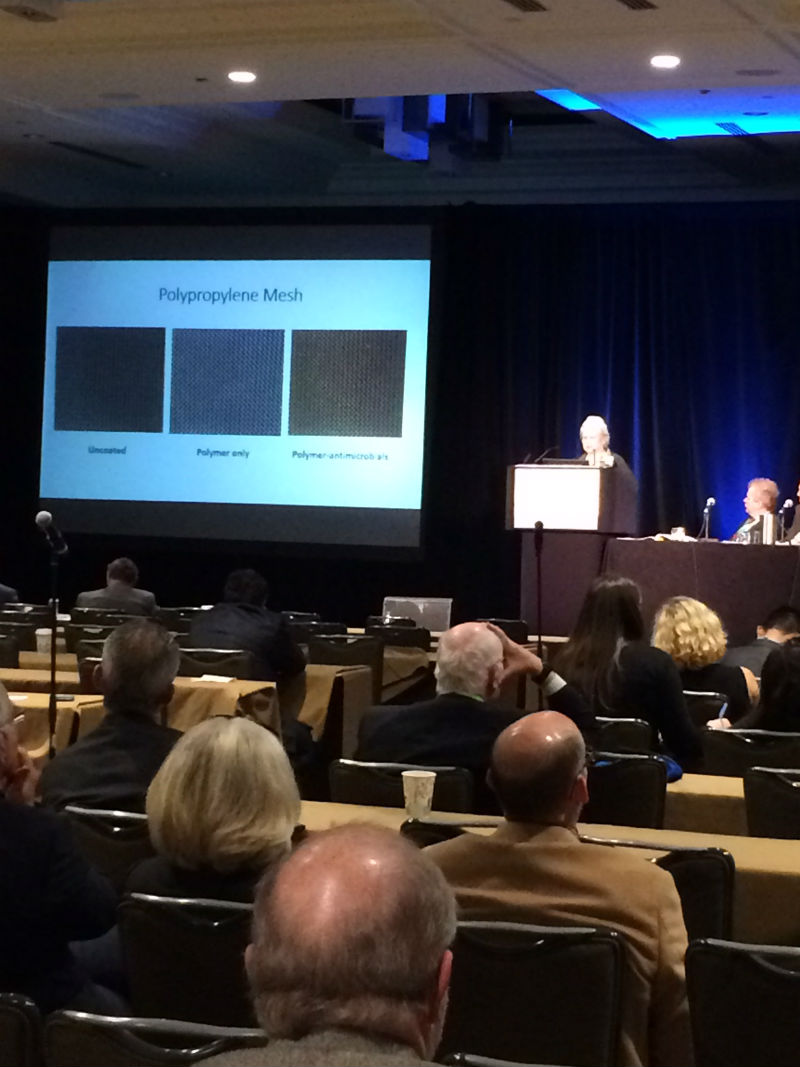Bacteria associated with mesh surgical site infections, like MRSA and E. coli, are both a threat to patient health and patient wallets. Among one of the riskier surgeries that use a mesh is ventral hernia repair, which can often result in high rates of infection.
The proliferation of these surgical site infections presented a need to develop a strategy for a new type of antimicrobial mesh. One such company developed a drug-eluting mesh that aims to prevent implantable surgical devices’ contamination by hitting a targeted area with bacteria-killing agents. In order to gain more insight on the mesh’s development, MDT spoke with Dr. Lisa Jennings, co-founder and chief scientific officer of Ariste Medical, the company that developed the mesh.

Dr. Jennings presenting the technology at the AHS in April 2016 in Washington, D.C.
What problem is the new antimicrobial graft addressing?
Dr. Jennings: Ariste’s technology is poised to drastically reduce bacterial colonization of surgical implants that are so often devastating to patients and care providers. In addition to infection, restenosis and thrombosis are common complications that lead to device failure.
Why ventral hernia repair as the first application?
Dr. Jennings: With more than 350,000 ventral hernia procedures performed annually, open ventral hernia repair is among the most common surgeries in the United States, but often results in high rates of infection, excess morbidity and healthcare expenses. As our technology can greatly reduce these unfortunate outcomes, we felt we could have the greatest impact by first aiming to improve the hernia repair procedure.
Additionally, there is an obvious clinical need with the reported rates of infection particularly in patients that are obese, chronic smokers, or that suffer from uncontrolled diabetes or repeat hernia repair procedures. In addition, with the increased scrutiny of the biologic meshes in terms of infection rates, a new alternative is necessary.
How do antimicrobial “synthetics” succeed where biologics fail? (Why polypropylene?)
Dr. Jennings: Most of the earlier products were either soaked or dip-coated with anti-microbial agents. Ariste’s technology, the first polypropylene coated antimicrobial graft for open ventral hernia repair, provides a programmed drug-elution profile that may include a burst release, a near-linear release of drug, and a gradual elution over the course of at least 14 days. While infection may be evident within days of a surgical procedure, other signs of infection may be much longer, even weeks after open ventral hernia repair. Our timeframe may have added benefit in preserving the implant and inhibiting bacterial colonization of the mesh. Our initial mesh will be polypropylene since it is the most common mesh material used by physicians for ventral hernia repair.
Beyond hernia repair, what other potential applications might the mesh have?
Dr. Jennings: We are not limited to a certain implantable material or drug combination. We anticipate making a significant impact in alleviating complications due to device implantation such as infection, scar tissue formation or clotting.




